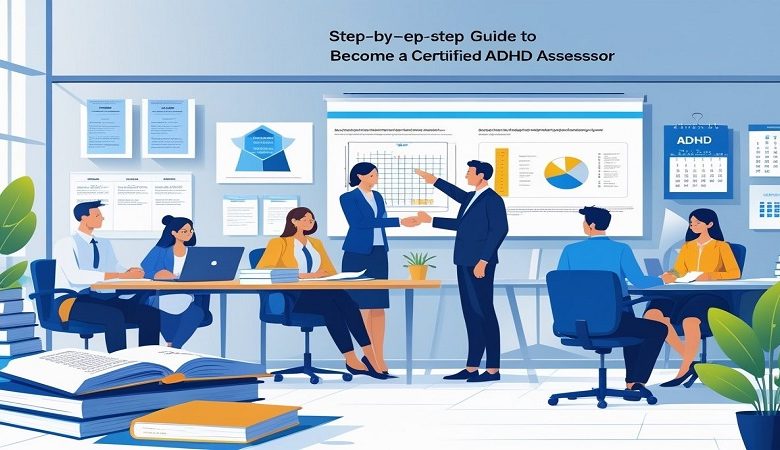
ADHD assessment has become increasingly important as more adults and children seek proper diagnosis and treatment for attention-related challenges. Healthcare professionals looking to specialize in this field often wonder about the specific requirements and training needed to become qualified assessors.
The path to becoming a certified ADHD assessor requires completing foundational education in psychology or healthcare, specialized ADHD training programs, and gaining supervised clinical experience in assessment and diagnosis. This certification process involves multiple levels of education and practical training that build expertise in recognizing ADHD symptoms and conducting thorough evaluations.
The certification journey varies depending on one’s current professional background and chosen specialization area. Understanding the specific steps, training requirements, and ongoing professional development needs helps professionals make informed decisions about pursuing this specialized career path in mental health assessment.
Understanding the Role and Pathways of a Certified ADHD Assessor
Certified ADHD assessors conduct comprehensive evaluations to diagnose attention deficit hyperactivity disorder in children and adults. Multiple certification pathways exist through specialized training programs and accrediting organizations that validate clinical expertise in ADHD assessment and treatment.
What Is a Certified ADHD Assessor?
A certified ADHD assessor is a mental health professional who specializes in the evaluation and diagnosis of attention deficit hyperactivity disorder. These professionals conduct comprehensive assessments using standardized diagnostic tools and clinical interviews.
ADHD assessors work with individuals across all age groups to identify symptoms and functional impairments. They administer psychological tests, gather developmental histories, and evaluate behavioral patterns to determine if criteria for ADHD diagnosis are met.
The role requires expertise in differential diagnosis since ADHD symptoms can overlap with other conditions. Assessors must distinguish ADHD from anxiety disorders, learning disabilities, and mood disorders through careful clinical evaluation.
Key responsibilities include:
- Conducting structured clinical interviews
- Administering standardized assessment tools
- Reviewing medical and educational histories
- Collaborating with other healthcare providers
- Writing comprehensive diagnostic reports
Essential Qualifications and Prerequisites
Most certification programs require a foundational degree in psychology, counseling, social work, or a related mental health field. A bachelor’s degree serves as the minimum educational requirement for entry-level certification programs.
Graduate-level education in clinical psychology or counseling psychology provides stronger preparation for ADHD assessment work. Many programs prefer candidates with master’s or doctoral degrees in mental health disciplines.
Educational prerequisites typically include:
- Bachelor’s degree in psychology or related field
- Graduate coursework in abnormal psychology
- Training in psychological assessment methods
- Clinical experience with diagnostic evaluations
Licensed mental health professionals often pursue ADHD certification to expand their practice areas. Psychologists, clinical social workers, and professional counselors commonly seek specialized ADHD training to serve this population effectively.
Supervised clinical experience working with ADHD populations strengthens certification applications. Many programs require documented hours of direct client contact under qualified supervision.
Major Certification Options and Accrediting Bodies
The ADHD-Certified Clinical Services Provider (ADHD-CCSP) certification represents one of the primary pathways for mental health professionals. This credential focuses on clinical assessment and treatment competencies for ADHD across developmental stages.
Certified ADHD Coach (CAC) certification through organizations like the International Coach Federation (ICF) emphasizes coaching rather than clinical diagnosis. These programs train professionals to provide behavioral support and life skills training.
Certification Type | Focus Area | Target Audience |
ADHD-CCSP | Clinical assessment and treatment | Licensed mental health professionals |
Certified ADHD Professional | Comprehensive ADHD services | Healthcare and education professionals |
CAC | Life coaching and behavioral support | Coaches and support professionals |
Professional organizations offer continuing education courses specifically designed for ADHD assessment training. These programs cover diagnostic criteria, assessment instruments, and evidence-based evaluation methods.
Specialized training institutes provide intensive workshops on ADHD evaluation techniques. Programs typically include hands-on practice with assessment tools and case study analysis to build practical skills.
Step-by-Step Process to Become a Certified ADHD Assessor
The certification process involves completing foundational education in psychology or healthcare, specialized ADHD training programs, supervised clinical experience, and ongoing professional development. These requirements ensure assessors can accurately evaluate diagnostic criteria and utilize proper assessment tools.
Complete Relevant Education and Licensure
Professionals must obtain a bachelor’s degree in psychology, social work, counseling, or a related healthcare field. Most states require a master’s degree for clinical practice.
The educational foundation should include coursework in abnormal psychology, developmental psychology, and psychopathology. These subjects provide essential knowledge about ADHD symptoms and comorbid conditions.
Common degree paths include:
- Master’s in Clinical Psychology
- Master’s in Counseling Psychology
- Master’s in Social Work (MSW)
- Doctor of Psychology (PsyD)
After completing their degree, professionals must obtain state licensure. Licensure requirements vary by state but typically include supervised clinical hours and passing a state examination.
Licensed professionals can legally conduct psychological assessments and provide mental health services. This licensure serves as the foundation for specialized ADHD assessment certification.
Finish Specialized ADHD Training Programs
Specialized training programs focus specifically on ADHD assessment and diagnosis across age groups. These programs cover adult ADHD presentations, which often differ from childhood symptoms.
Training covers diagnostic criteria from the DSM-5-TR and ICD-11. Professionals learn to identify primary ADHD symptoms including inattention, hyperactivity, and impulsivity patterns.
Key training components include:
- Assessment tools and rating scales
- Differential diagnosis techniques
- Comorbidity identification
- Cultural considerations in assessment
Organizations like PESI offer comprehensive ADHD certification programs. These programs typically require 12-16 hours of specialized education focused on ADHD assessment and treatment.
Many programs include practical case studies and hands-on experience with standardized assessment instruments. This practical component helps professionals apply theoretical knowledge in real-world settings.
Gain Supervised Clinical Experience
Supervised clinical experience provides direct exposure to ADHD assessment procedures. Trainees work under experienced clinicians to develop practical skills in evaluation and diagnosis.
Clinical experience typically involves conducting comprehensive ADHD assessments. This includes administering assessment tools, interpreting results, and writing diagnostic reports.
Experience requirements often include:
- Minimum 200-500 hours of supervised practice
- Direct client contact with ADHD assessments
- Case consultation and review
- Documentation and report writing
Supervisors evaluate the trainee’s competency in differential diagnosis. This ensures they can distinguish ADHD from other conditions with similar symptom presentations.
The supervised period allows professionals to refine their assessment techniques. They learn to adapt evaluation methods for different age groups and cultural backgrounds.
Maintain Certification Through Continuing Education
Continuing education ensures assessors stay current with evolving diagnostic criteria and assessment methods. Most certifications require annual or biennial education credits.
Typical requirements include:
- 10-20 hours of continuing education annually
- ADHD-specific training content
- Evidence-based practice updates
- Ethical considerations in assessment
Professional development focuses on new research findings and updated diagnostic tools. This includes learning about emerging assessment technologies and refined evaluation methods.
Many professionals pursue additional certifications or advanced training programs. These enhance their expertise and credibility as ADHD specialists in their field.
Certification maintenance also involves staying informed about changes to diagnostic criteria. Regular training ensures assessors maintain accuracy and reliability in their evaluations.




